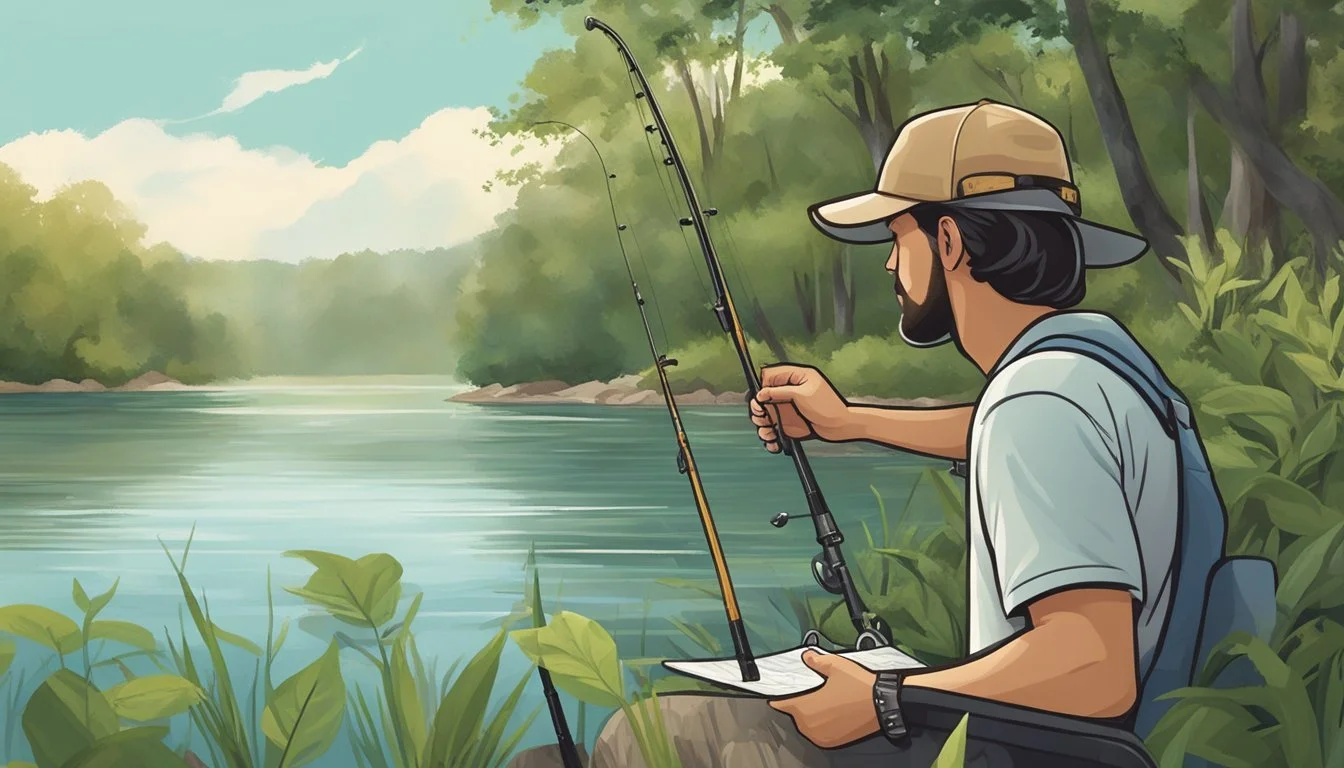How to Get a Texas Freshwater Fishing License
A Step-by-Step Guide
In Texas, fishing is both a cherished pastime and a managed natural resource. Anyone over the age of 17 looking to fish (What wine goes well with fish?) in Texas' plentiful freshwater bodies must have a valid fishing license. This requirement is part of the Texas Parks & Wildlife Department's effort to conserve fish populations and provide sustainable fishing for future generations. Licenses are available for both residents and non-residents, and there are multiple options depending on one's needs, from short-term to annual licenses.
The process of obtaining a fishing license in Texas is straightforward and can be completed online, by phone, or in person at various retailers across the state. Anglers must decide between freshwater or all-water licenses, as freshwater licenses do not cover saltwater fishing activities. Additionally, the state offers different packages and endorsements that can be added to the base license, tailoring to the specific type of fishing one intends to engage in.
It’s important for anglers to know that fishing without a valid license can result in penalties. Thus, ensuring one's licensure is not only a contribution to conservation efforts but also a legal necessity. Revenue generated from fishing licenses helps fund fisheries management, habitat development, and preservation efforts, which assist in maintaining the health and diversity of Texas' aquatic ecosystems.
Eligibility and Requirements
To fish in Texas' freshwater bodies, individuals must meet specific requirements and possess a valid fishing license. The criteria vary depending on residency status, age, and special provisions for veterans and individuals with disabilities.
Residency Criteria
A Texas resident is someone who has lived in the state for at least six consecutive months before applying for a license. Proof of residency can be established with a Texas driver's license, a state ID card, or other acceptable documents. Non-residents can also purchase a fishing license but might be subject to different fees and requirements. Individuals who do not meet the residency requirement are considered non-residents.
Age-Based Considerations
In Texas, residents and non-residents under 17 years of age are exempt from holding a fishing license. For all others, a license is mandatory when fishing in public waters. Texas residents over the age of 17 are required to obtain a resident fishing license, while non-residents of the same age range must secure a non-resident license.
Special Provisions for Veterans and Individuals with Disabilities
Texas offers special licensing privileges for veterans and individuals with permanent disabilities. Disabled veterans who can furnish proof of a service-connected disability may be eligible for special discounted licenses. Individuals with an intellectual disability fishing as part of medically approved therapy, under the supervision of personnel approved by the hospital, and carrying proper documentation, may be exempt from licensing requirements.
Types of Fishing Licenses
In Texas, anglers must choose the appropriate fishing license based on where they intend to fish—freshwater, saltwater, or both. The state offers a range of licenses to suit different needs, including combination packages and options for lifetime coverage.
Freshwater vs. Saltwater Options
Texas issues distinct licenses for fishing in freshwater and saltwater environments. Residents and non-residents must have a freshwater fishing license to legally fish in the state’s freshwater bodies. Conversely, the saltwater fishing license is required for fishing in coastal waters. Each license has specific endorsements to ensure legal compliance with state regulations.
Combination Packages
For those who enjoy fishing in both freshwater and saltwater, combination packages are available. These packages provide comprehensive coverage and convenience, offering a cost-effective solution for avid anglers. The Senior Freshwater Package, Senior Saltwater Package, and Senior All-Water Package cater to Texas seniors with reduced pricing. For residents who desire maximum flexibility, the Special Resident All-Water Fishing License covers all types of fishing.
Lifetime Licenses
Texas additionally offers lifetime licenses for those committed to fishing over the long term. The lifetime options eliminate the need to renew annually and ensure continual compliance with Texas fishing regulations. Both residents and non-residents can invest in a lifetime fishing license, granting them access to Texas waters indefinitely without the need to purchase annual renewals.
How to Purchase a License
Purchasing a Texas freshwater fishing license involves a few straightforward steps. Individuals can opt to buy their license online, via a mobile application, at various in-person venues, or through TPWD offices and licensed retailers. Each purchasing method is designed to accommodate the preferences and needs of different anglers.
Online and Mobile App Procedures
Texas residents and non-residents can purchase a fishing license using the Texas Parks and Wildlife Department's (TPWD) online sales system or the TPWD mobile app, named "Outdoor Annual." The online purchase includes an administrative fee of $5. When buying licenses online, one can select between a variety of licenses and endorsements, including resident, senior resident, or non-resident options. Digital licenses are available but are not fully digital for all options.
In-Person Venues
Licenses can also be acquired directly through in-person purchases at TPWD offices across Texas. These offices offer personal assistance and the possibility to ask questions directly to TPWD staff. An all-water package, which allows fishing in both fresh and salt water, can be purchased here, along with the required endorsements.
Retail Outlets and TPWD Offices
In addition to TPWD offices, licenses are available at various authorized retail outlets. These include grocery stores, sporting goods stores, and gun shops, providing convenient access to licenses for individuals as they shop for other supplies. Retail outlets may offer additional tangible items such as tags and permits necessary for certain fishing activities. Fees are comparable to those found online and at TPWD offices, but without the $5 administrative fee associated with transactions made via the internet.
Costs and Fees
The acquisition of a Texas freshwater fishing license includes various fees, such as the basic license costs, stamp endorsements, and administrative charges. These fees are structured to support fishery management and conservation efforts within the state.
License Fees
Fishing license fees in Texas vary based on residency status and the type of license. The general fee for a resident freshwater fishing license is within the range of $30 to $40. A non-resident freshwater license generally costs more. Texas also offers an all-water package, which covers both freshwater and saltwater fishing, for residents who wish to fish in all public waters.
Resident Freshwater Fishing License: Approximately $30 - $40
Non-Resident Freshwater Fishing License: Higher fee
All-Water Fishing License Package: Priced higher than the freshwater-only license
Stamp Endorsements
In addition to the basic fishing license, certain activities require an endorsement. For instance, a freshwater endorsement is mandatory for those fishing in freshwater, likewise a saltwater endorsement for saltwater fishing. Special tags like the bonus red drum tag are required for anglers who wish to take additional Red Drum in saltwater beyond the standard bag limit.
Freshwater Endorsement: Required for freshwater fishing
Saltwater Endorsement: Required for saltwater fishing
Bonus Red Drum Tag: Extra fee for additional catches
Administrative and Handling Fees
When processing fishing licenses online, an administrative fee of approximately $5 is charged. It's important to note that while licenses can be purchased online, not all licenses are completely digital, and some may need to be mailed, which can incur additional fees. For persons desiring immediate fishing access, a one-day all-water license can be obtained, which includes handling charges.
Online Transaction Fee: Approximately $5
One-Day All-Water License: Includes additional handling fees
Non-Digital License Processing: May incur a mailing fee
Regulations and Usage
In Texas, anglers need to understand specific fishing rules and adhere to established limits to maintain the state's aquatic ecosystems. This section details essential regulations and usage guidelines for freshwater fishing in the state.
Fishing Rules and Limits
Texas requires all anglers to have a valid fishing license with a freshwater endorsement when fishing in public waters. It is important to note that different species of fish, such as the red drum, which is also available in freshwater systems, may have additional size and bag limits. These rules are subject to change, so they must verify current regulations before fishing.
They must follow daily bag and length limits which are species-specific as outlined by the Texas Parks & Wildlife Department (TPWD). For example:
Daily Bag Limits for Catfish:
Channel and blue catfish: 25 in combination
Length Limits:
Alligator gar: 1 per day, and anglers should check for mandatory reporting requirements.
Lake Texoma is a unique body of water that straddles the Texas-Oklahoma border. When fishing solely in the Texas portion of Lake Texoma, a Texas freshwater license is sufficient. However, they need a Lake Texoma fishing license to fish in both Texas and Oklahoma waters.
Special Area Regulations
Certain areas in Texas may have region-specific rules that supersede general state regulations. Texas State Parks may permit fishing under more lenient rules—for instance, they may not require a fishing license when fishing from the shore within a state park.
There are special regulations for Lake Texoma, often for species like striped bass or other game and non-game fish. Anglers targeting these species must be aware of the specific limits and restrictions that apply to the lake.
In addition, Texas has established a Reptile and Amphibian Endorsement for those persons wishing to engage in the trapping or collection of certain species. Any individual aiming to collect or fish for certain nongame species such as frogs, turtles, or reptiles needs to acquire this endorsement.
Lastly, those who plan to pursue migratory game birds, including certain species that could be targeted while fishing, must obtain a Migratory Game Bird Endorsement.
These rules facilitate the sustainability of Texas's diverse aquatic life and ensure recreational fishing can be enjoyed by future generations. Anglers are advised to consult the TPWD for the most up-to-date information on regulations and necessary endorsements.
Additional Benefits and Opportunities
When acquiring a Texas freshwater fishing license, anglers gain more than just legal permission to fish; they unlock a variety of additional benefits and opportunities designed to enhance their fishing experience and contribute positively to the community.
Free Fishing Days
Texas offers Free Fishing Days during which anyone can fish in public waters without a license, providing a great opportunity for friends and family to try fishing at no cost. These days typically occur annually, often on the first Saturday in June.
Educational Programs
The Texas Parks & Wildlife Department organizes educational programs aimed at promoting fishing and conservation. Participants in these programs can learn about different species, effective fishing techniques, and ecosystem health. This education helps ensure the preservation of Texas' freshwater environments.
Veteran Services
Veterans in Texas have access to several services tied to fishing licenses. The Fund for Veterans Assistance may support programs that include fishing as a form of medically approved therapy. Additionally, the state may offer discounted or special licenses to veterans. Programs like Hunters for the Hungry also allow anglers and hunters to give back by providing caught fish to those in need, often including veterans and their families.
Compliance and Enforcement
Obtaining a Texas freshwater fishing license complies with state regulations, and enforcement ensures the conservation of aquatic resources. Licensed anglers must understand the importance of carrying proof of license and the consequences for non-compliance to avoid legal issues and support sustainable fishing practices.
Carrying Proof of License
When fishing in Texas' public waters, individuals are required to have a valid fishing license. Proof of residency and appropriate identification must be presented when obtaining the license. Once a license is acquired, licensed anglers must carry it at all times while fishing, as they may be asked to present it to game wardens or other law enforcement officers.
Proof of License: Must be presented upon request by law enforcement.
Consequences for Non-Compliance
Failure to comply with licensing requirements can lead to several punitive measures. Individuals fishing without a valid license can face fines and legal action. Additionally, repeated offenses could lead to increased scrutiny for both recreational and commercial licenses, and in some cases, revocation of fishing privileges.
Punitive Measures for Non-Compliance:
Fines
Legal action
Possible revocation of fishing and hunting licenses







